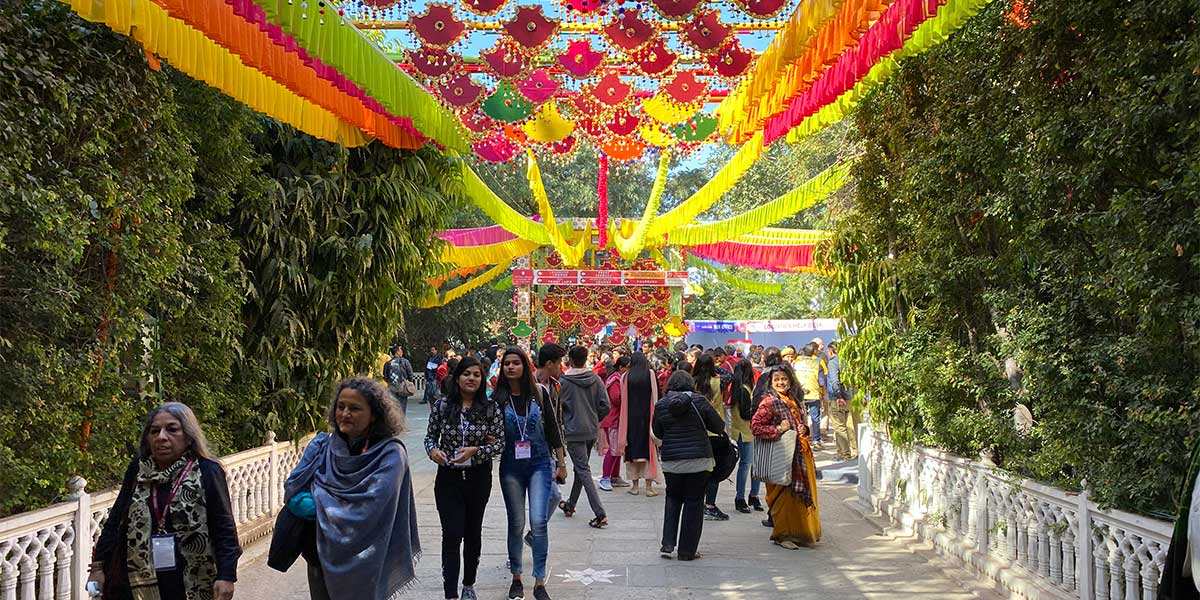Promoting pluralism, celebrating dialogue – The Jaipur Literature Festival’s first decade
The Jaipur Literature Festival’s first decade

Flying back to India after several months away, I am excited to return to a country I called home for three years. One of the annual highlights of my time here was the Jaipur Literature Festival, which combined all the things I loved most about India: its intellectual energy, its zest for life, and its intense opinions. It is fitting then that I return this week to speak at JLF, where, among others, the Aga Khan Foundation is sponsoring a session on the role of the liberal arts and the sciences in building strong societies.
Marking its 10th anniversary, the Jaipur Literature Festival has been celebrating reading and learning – and all that is best about India’s vibrant, noisy, loquacious democracy – for a decade. JLF is a symbol of how India’s multi-decade investment in its universities, combined with its centuries-old love of learned inquiry and philosophical reflection, have underpinned its modern development and its social, economic, and technological achievements.
Acknowledging India’s rise is not to ignore its myriad challenges. Too many people live in poverty, with too few job opportunities. Too many children go to bed hungry, malnourished and stunted. Too few have the opportunity to attain a basic education, let alone earn university degrees. Nevertheless, the progress made over the past twenty-five years has been substantial. India’s highly-educated college graduates and good universities are a vital resource for the country’s future, underpinning the social and economic gains already made and those that will narrow the numbers of the poor and excluded in the decades ahead.
In the 1960s, when many development economists scoffed, India made significant and fundamental investments in higher education, especially its well-regarded IIT system. Thirty years later, it was India’s example that led to a re-evaluation of higher education’s value by the World Bank and others, and a new appreciation for the gains that strong universities can bring to countries with undereducated populations and extreme poverty.
India’s example, along with decades of experience in Asia and Africa, is among the sources of inspiration for one of world’s boldest academic debuts. In September, the University of Central Asia admitted its first undergraduate class and inaugurated its first campus in Naryn, a secondary town in the Kyrgyz Republic near the Chinese border. It is the first of three such campuses planned in the region under a unique partnership between the governments of Kazakhstan, the Kyrygz Republic, Tajikistan and the Aga Khan Development Network.
The objective is to establish a world-class regional university in the heart of Central Asia. By offering a top education in the liberal arts, as well as traditional science and technology disciplines, UCA will help train the next generation of Central Asian leaders – leaders with the skills and creative thinking needed to respond to regional challenges and opportunities. Just as the Silk Route brought learning and prosperity to Central Asia and Europe, UCA seeks nothing less than to catalyse an intellectual and economic transformation on the Central Asian steppe, especially among its remote and marginalised mountain communities.
Against this backdrop, the Aga Khan Foundation and Wesleyan University will convene a discussion in Jaipur this week on “Building Countries: Science or the Liberal Arts?” Anchoring the panel is Michael S. Roth, President of Wesleyan and author of the well-regarded Beyond the University: Why Liberal Education Matters (2015), which makes a strong case for the value universities bring to societies, especially the constructive role they can play when combined with the critical and creative faculties nurtured by the liberal arts. Harvard’s Tarun Khanna will speak about his research over two decades into the fundamentals that drive growth and entrepreneurship in emerging markets, of which higher education is certainly one. Aditya Mukherjee, Director of JNU’s Center for Advanced Study, Devesh Kapur, Director of the University of Pennsylvania’s Center for the Advanced Study of India, and the renowned poet and author Sukrita Paul Kumar, will each draw on the Indian experience, which has benefited greatly from its well-educated diaspora as well as those taught in its own institutions. I will speak about AKDN’s experience at UCA and the Aga Khan University, which in South Asia operates in Pakistan and Afghanistan, and in East Africa has a presence in Kenya, Tanzania, and Uganda.
Amidst headlines around the world about fake news, populist sensation, and illiberal tendencies, gatherings like the Jaipur Literature Festival are important. They remind us that ideas matter, but that they matter most when subject to critical scrutiny, rigorous debate, and open dialogue. Whether through traditions like JLF or institutions like universities, our countries need these pillars of civil society to help us understand our changing world, imagine alternatives, and debate our futures. As we join in Jaipur this week to celebrate JLF’s first decade and launch its second we do well to remember that it is on such foundations that stable, successful, pluralistic societies are built and maintained.
Matt Reed is CEO of AKF, UK

Support our work Your donations are helping us build a future where we all thrive together.